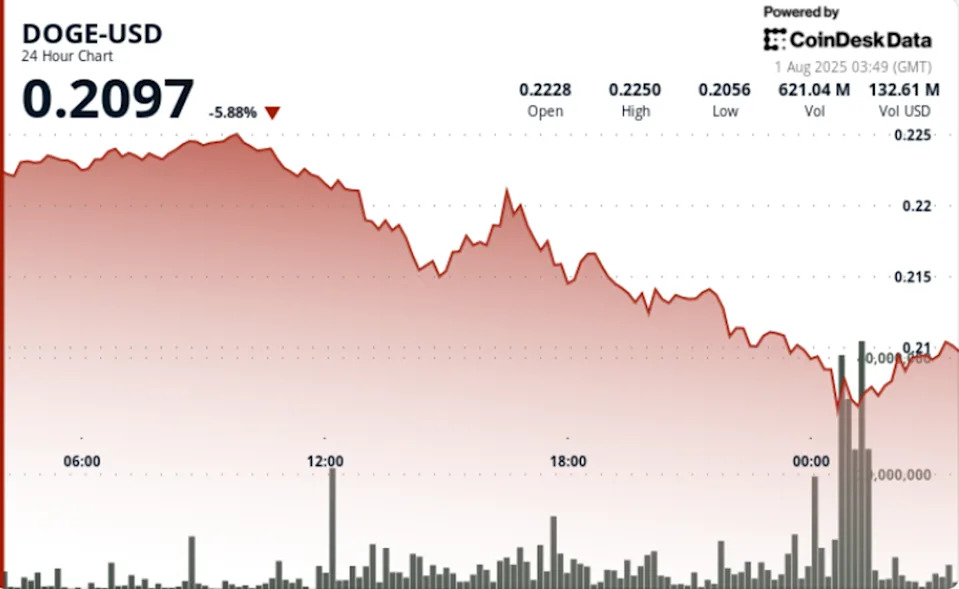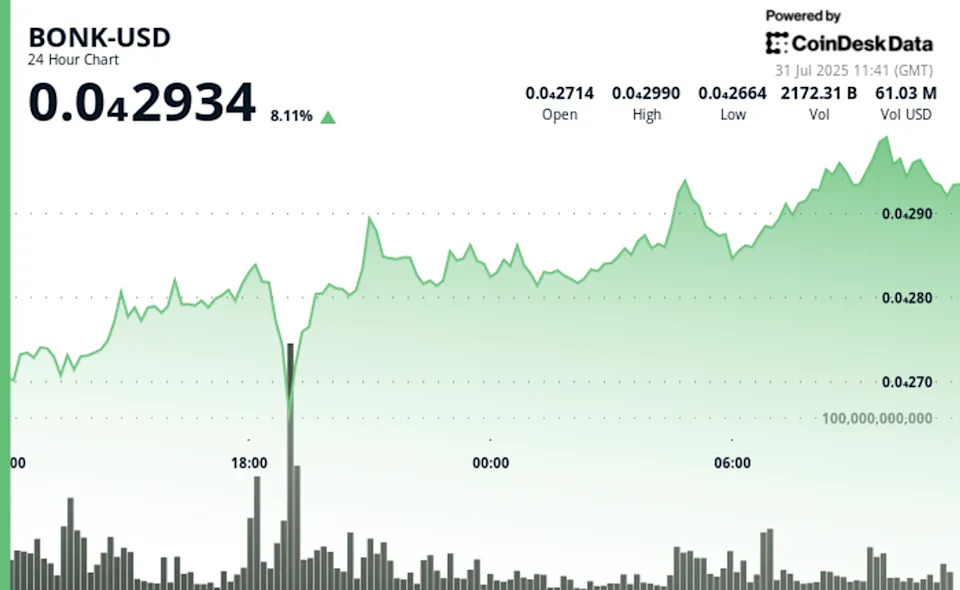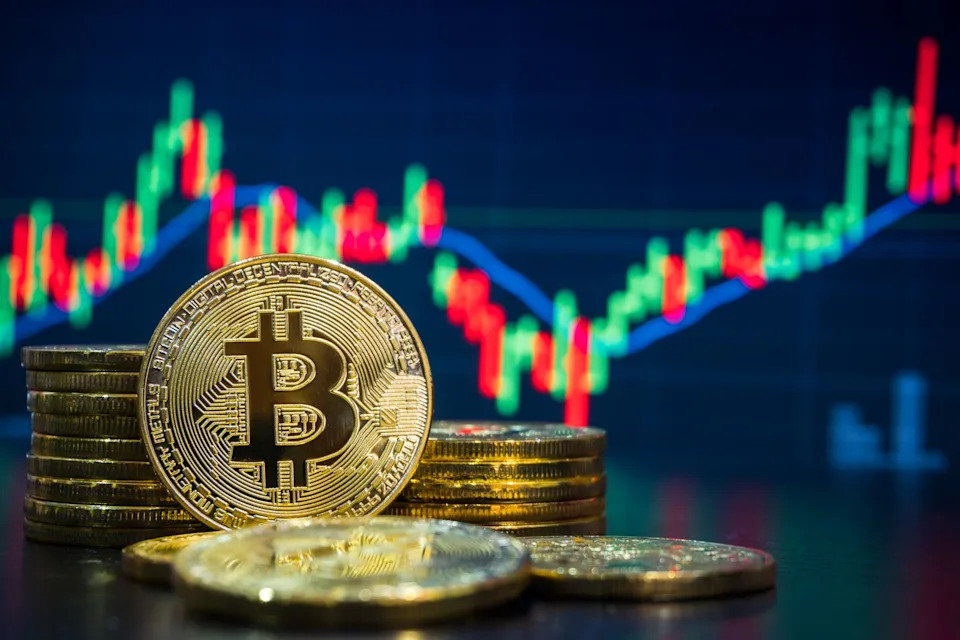Thank you! Your submission has been received!
Oops! Something went wrong while submitting the form.

DOGE Suffers 8% Drop but Signs of Institutional Accumulation at 21-Cents
Key Points
- DOGE experienced an 8% drop from $0.22 to $0.21 between July 31 and August 1, one of the steepest declines this month.
- Trading volume surged to 1.25 billion DOGE around midnight, far exceeding the 24-hour average of 365 million, indicating heavy liquidation activity.
- Resistance at $0.23 held strong, while $0.21 emerged as short-term support with signs of stabilization.
- Institutional wallets accumulated 310 million DOGE during the dip, and Bit Origin added 40 million DOGE to its treasury.
- Broader crypto market sentiment remains pressured by macroeconomic uncertainty, including inflation and interest rate ambiguity.
Summary
Dogecoin (DOGE) saw a significant 8% decline from $0.22 to $0.21 between July 31 and August 1, marking one of the steepest daily drops this month. The price fluctuated within a $0.03 range, peaking at $0.23 and bottoming at $0.20, with strong resistance at the upper limit and stabilization near $0.21. Trading volume spiked to 1.25 billion DOGE around midnight, nearly triple the daily average, suggesting intense liquidation and cascading sell orders. Despite the downturn, institutional wallets accumulated 310 million DOGE, and Bit Origin added 40 million to its treasury as part of a $500 million diversification strategy. The broader crypto market faces headwinds from macroeconomic uncertainty, with inflation and interest rate concerns dampening sentiment. Technically, repeated tests of $0.21 support and a narrowing price band hint at potential exhaustion of selling pressure. Traders are now monitoring whether DOGE can hold above the $0.20–$0.21 range, alongside macroeconomic signals and further institutional accumulation.
yahoo
August 1, 2025
Crypto

Y Combinator is looking for DOGE-related startups for its next cohort — and 5 other themes
Key Points
- Y Combinator (YC) has opened applications for its fall cohort, focusing on six innovative startup themes, including cutting government waste through large language model (LLM)-powered software to replace traditional consulting giants like Deloitte and Accenture.
- YC is betting on the potential of small, high-agency teams to build massive companies, predicting the emergence of a 10-person, $100 billion company using AI tools for efficiency.
- Other themes include AI training for blue-collar workers, video generation as a core software technology, infrastructure for multi-agent AI systems, and AI-native enterprise software.
- The accelerator highlights political pressure to reduce government spending, noting the US government's $100 billion annual expenditure on consulting as a key area for innovation.
- Applications for YC’s Fall 2025 cohort close on Monday evening, Pacific time, signaling Silicon Valley’s direction for the next wave of breakout companies.
Summary
Y Combinator (YC) has launched applications for its Fall 2025 cohort, spotlighting six startup themes with a strong emphasis on innovation through AI and efficiency. A key focus is on reducing government waste by funding startups that develop large language model (LLM)-powered software to replace costly consulting services, addressing the US government’s $100 billion annual consulting expenditure amid political pressure for cuts. Other themes include creating AI training for blue-collar workers, leveraging video generation as a core software technology, building infrastructure for multi-agent AI systems, reinventing enterprise tools with AI at their core, and betting on the rise of a 10-person, $100 billion company enabled by AI efficiency. YC believes small, agile teams can scale rapidly without the bureaucratic drag of larger firms. The accelerator’s “Request for Startups” signals Silicon Valley’s future direction, with applications closing Monday evening, Pacific time. This initiative reflects broader trends of using technology to solve systemic inefficiencies and reshape industries, from government operations to media and enterprise solutions.
yahoo
August 1, 2025
Crypto

Cathie Wood bets on AI stock over Bitcoin again
Key Points
- Cathie Wood's Ark Invest continues to reduce exposure to Bitcoin-related stocks, selling $930,000 worth of Block Inc. shares on July 30, following a $1.5 million selloff earlier in the week.
- Ark Invest is redirecting funds into artificial intelligence, with Ark’s Space Exploration ETF purchasing 3,351 shares of AMD worth approximately $601,538 on the same day.
- AMD, a major semiconductor company and Nvidia rival, raised the price of its Instinct MI350 AI data-center chip by 70%, signaling confidence in its competitive edge in the AI market.
- AMD's stock surged nearly 14% over the past week, with analysts raising price targets due to expected growth in AI GPU revenue.
- Despite AMD's gains, Nvidia still dominates over 80% of the AI GPU market.
Summary
Cathie Wood, CEO of Ark Invest, is shifting her investment focus from Bitcoin-related stocks to artificial intelligence. On July 30, Ark sold $930,000 worth of Block Inc. shares, a payments company tied to Bitcoin, marking the second significant selloff of the week after a $1.5 million sale on July 29. Meanwhile, Ark’s Space Exploration ETF invested approximately $601,538 in AMD, a leading semiconductor company challenging Nvidia in the AI chip market. AMD recently increased the price of its Instinct MI350 AI chip by 70%, reflecting confidence in its competitive hardware, with claims of better cost-performance than Nvidia’s offerings. Despite Nvidia’s 80% dominance in the AI GPU market, AMD’s stock rose nearly 14% in a week, buoyed by analyst optimism for its AI revenue growth. Wood’s moves signal a strong bet on AI’s future over Bitcoin-related investments, with additional adjustments in Ark’s portfolio including stakes in SoFi, PagerDuty, Roku, and Joby Aviation.
yahoo
July 31, 2025
Crypto

BONK Rallies 8% Ahead of Trillion-Token Burn Milestone
Key Points
- BONK surged 8.39%, rising from $0.000028 to $0.000029, continuing its bullish momentum with ascending lows consolidating around $0.000027–$0.000028.
- The token hit a psychological resistance at $0.00003, facing sell-side pressure and retreating 1.58% to $0.000029 after an intraday high.
- Increased trading volume during the pullback suggests profit-taking rather than a trend reversal, maintaining a short-term bearish retracement.
- A potential deflationary event looms with a planned burn of 1 trillion tokens upon reaching 1 million on-chain holders, which could reduce circulating supply significantly.
Summary
BONK, a meme token, experienced a significant 8.39% increase, moving from $0.000028 to $0.000029, as part of its ongoing bullish trend with support consolidating between $0.000027 and $0.000028. Despite this upward momentum, the token encountered resistance at the psychologically important $0.00003 level, leading to a 1.58% pullback to $0.000029 after reaching an intraday high at 09:58 UTC. The retreat, accompanied by heightened trading volume, indicates localized profit-taking rather than a broader reversal of the bullish structure characterized by higher lows. Technical analysis from CoinDesk highlights strong consolidation in the lower range and a bearish rejection at the resistance, suggesting a short-term retracement. Adding to the token’s bullish fundamentals is an upcoming deflationary event: BONK’s protocol plans to burn 1 trillion tokens once it achieves 1 million on-chain holders, marking one of the largest burns in its history and potentially reducing circulating supply significantly. While the token shows promise, resistance at key levels and market dynamics continue to shape its near-term trajectory.
yahoo
July 31, 2025
Crypto

Dear MicroStrategy Stock Fans, Mark Your Calendars for July 31
Key Points
- Bitcoin Resurgence: Bitcoin (BTCUSD) has surged nearly 25% in three months, partly due to a proposed Strategic Bitcoin Reserve by President Trump, signaling a shift in federal policy.**
- MicroStrategy's Bitcoin Holdings: MicroStrategy (MSTR), the largest corporate holder of Bitcoin, owns 628,791 BTC as of July 29, with a market cap of $110 billion.**
- Stock Performance: MSTR stock has risen 36% YTD and 134% over the past 52 weeks, though it trades at a high valuation of 239 times forward sales.**
- Q1 Earnings Miss: MicroStrategy's Q1 fiscal 2025 results showed a revenue drop of 3.6% to $111.07 million and a net loss of $4.2 billion, despite growth in subscription services.**
- Analyst Outlook: Analysts rate MSTR as a “Strong Buy” with an average price target of $548.69, indicating a potential 39% upside, while TD Cowen projects a 72% increase to $680.**
Summary
Bitcoin (BTCUSD) has experienced a remarkable 25% surge in just three months, fueled by President Trump’s proposed Strategic Bitcoin Reserve, which could position the U.S. as a major institutional holder if implemented. This bullish sentiment has revitalized institutional investment in the cryptocurrency. Meanwhile, MicroStrategy (MSTR), dubbed the world’s first “Bitcoin Treasury Company,” holds 628,791 BTC and boasts a $110 billion market cap. Its stock has soared 36% year-to-date and 134% over the past year, though it trades at a steep 239 times forward sales. Despite a disappointing Q1 fiscal 2025 with a 3.6% revenue decline to $111.07 million and a $4.2 billion net loss, the company expanded its Bitcoin holdings significantly. Analysts remain optimistic, rating MSTR a “Strong Buy” with a potential 39% upside to $548.69, while TD Cowen predicts a rise to $680. As MicroStrategy prepares for its Q2 earnings, expectations are high for a narrowed loss per share, reflecting its strategic focus on Bitcoin as digital capital.
yahoo
July 30, 2025
Crypto

BlackRock-backed firm records shocking revenue growth
Key Points
- SoFi Technologies reported a 44% increase in adjusted net revenue for Q2 2025, reaching a record $858 million, with a net income of $97.2 million and adjusted EPS of $0.08.
- SoFi plans to introduce blockchain-enabled global money transfers and return to crypto investing, as announced in their recent financial results.
- BlackRock, a major asset manager with over $1 billion in SOFI shares, supports SoFi, while Vanguard, the largest SoFi shareholder, holds $2.2 billion in shares.
- Vanguard, despite skepticism toward crypto, offers indirect exposure through investments in SoFi and Michael Saylor's Strategy, the largest public corporate holder of Bitcoin.
- SOFI stock surged 6.5% on July 29, 2025, closing at $22.40, reflecting strong market confidence in the company’s performance.
Summary
SoFi Technologies, a financial services company, reported exceptional Q2 2025 results on July 29, with adjusted net revenue soaring 44% to a record $858 million, net income at $97.2 million, and adjusted EPS at $0.08. CEO Anthony Noto attributed this growth to record new member additions, innovative products, and increased fee-based revenue. SoFi also unveiled plans for blockchain-enabled global money transfers and a return to crypto investing. BlackRock, holding over $1 billion in SOFI shares, backs the company, while Vanguard, the largest shareholder with $2.2 billion, offers indirect crypto exposure despite its crypto skepticism. Vanguard also holds significant stakes in Michael Saylor’s Strategy, the largest public corporate Bitcoin holder with 628,791 BTC worth over $74 billion. SoFi’s stock jumped 6.5% to close at $22.40 on the reporting day, signaling strong investor confidence. This story, originally published by TheStreet, highlights SoFi’s robust growth and strategic moves in the fintech and crypto spaces, supported by major institutional investors like BlackRock and Vanguard.
yahoo
July 30, 2025
Crypto

Asia Morning Briefing: SEC's In-Kind BTC, ETH ETF Redemption Shift Happened Years Ago in Hong Kong
Key Points
- SEC Approval for In-Kind Redemptions: The U.S. Securities and Exchange Commission (SEC) now permits in-kind redemptions for bitcoin and ether ETFs, allowing institutional traders to create and redeem shares directly in BTC or ETH, enhancing efficiency by bypassing fiat conversions.**
- Hong Kong's Early Adoption: Hong Kong's Securities and Futures Commission (SFC) allowed in-kind redemptions for crypto ETFs as early as late 2023, supported by strict licensing and custody requirements, avoiding the regulatory hesitancy seen in the U.S.**
- U.S. Regulatory Challenges: U.S. regulators initially favored cash-only redemptions due to concerns over custody, anti-money laundering risks, and market manipulation, despite internal criticism from SEC Commissioner Mark Uyeda.**
- Tracking Issues with ETF Flows: In-kind redemptions complicate tracking ETF inflows and outflows, as crypto data aggregators like SoSoValue struggle to account for non-cash subscriptions, potentially obscuring investor sentiment metrics.**
Summary
The U.S. Securities and Exchange Commission (SEC) has recently approved in-kind redemptions for bitcoin and ether exchange-traded funds (ETFs), allowing institutional traders to handle shares directly in cryptocurrency, streamlining processes by avoiding fiat conversions. This contrasts with Hong Kong, where the Securities and Futures Commission permitted such redemptions since late 2023, backed by strict licensing and custody rules, showcasing clearer regulatory foresight. In the U.S., initial reluctance stemmed from concerns over custody, anti-money laundering, and market manipulation, leading to a cash-only approach criticized by SEC Commissioner Mark Uyeda for lacking justification compared to commodity ETFs like gold. This policy shift highlights the SEC’s cautious evolution, unlike Hong Kong’s cohesive rollout. However, a challenge emerges in tracking ETF flows, as in-kind transactions obscure cash inflow data, complicating investor sentiment analysis, according to crypto data aggregator SoSoValue. Meanwhile, market updates show bitcoin trading above $117,500 with weak momentum due to ETF outflows and macro pressures, while ether holds above $3,700, viewed as a strong institutional bet. Gold and U.S. stocks reflect mixed economic signals, and Asia-Pacific markets remain uneven amid looming U.S. tariff deadlines.
yahoo
July 30, 2025
Crypto

XRP Accumulation Plan Boosts Hyperscale Data Stock by 12%
Key Points
- Hyperscale Data (GPUS) shares surged up to 12% and closed up 7.5% at $0.7835 after confirming the acquisition of XRP as part of a $10 million digital asset strategy.
- The company views XRP as a scalable foundation for cross-border value transfer and emerging financial infrastructure, as stated on July 28.
- Executive Chairman Milton “Todd” Ault III described XRP as a “foundational asset in the evolving global financial ecosystem.”
- Hyperscale plans to provide weekly updates on XRP holdings starting August 12 and is considering a 36-month lockup for its reserves.
- The company may increase the $10 million investment cap based on market conditions and financing availability.
Summary
Hyperscale Data (GPUS) saw its shares rise by as much as 12% on Monday, closing up 7.5% at $0.7835, following the confirmation of its acquisition of XRP as part of a previously announced $10 million digital asset strategy. In a statement dated July 28, the company highlighted XRP’s potential as a scalable solution for cross-border value transfer and emerging financial infrastructure. Executive Chairman Milton “Todd” Ault III emphasized XRP’s role as a foundational asset in the evolving global financial ecosystem. Hyperscale Data also announced plans to release weekly updates on its XRP holdings starting August 12, while considering a 36-month lockup for its reserves. Additionally, the company may expand its $10 million investment cap depending on market conditions and available financing. This move reflects Hyperscale’s strategic focus on integrating digital assets into its broader financial framework, positioning itself within the rapidly changing landscape of global finance.
yahoo
July 29, 2025
Crypto

Prediction: 2 of Crypto's Biggest Winners -- XRP and Bitcoin -- Will Lose 50% (or More) of Their Value Over the Next 2 Years
Key Points
- Ripple-developed XRP and Bitcoin have led the cryptocurrency rally, with trailing-three-year gains of 773% and 426%, respectively.
- Both cryptocurrencies have benefited from President Trump's November victory, his pro-crypto stance, and the rise of spot crypto exchange-traded funds (ETFs).
- Despite their success, tangible and sentiment-based headwinds could cause XRP and Bitcoin to plunge by 50% or more over the next 24 months.
- XRP faces challenges with limited adoption among financial institutions and competition from other blockchain networks and traditional systems like SWIFT.
- Bitcoin struggles with real-world utility issues, potential changes to its fixed coin supply, and unsustainable hype from the Bitcoin treasury strategy.
Summary
Over the past decade, cryptocurrencies like XRP and Bitcoin have outpaced traditional stock markets, with market values soaring from $5 billion to $3.83 trillion by July 24. XRP, developed by Ripple, and Bitcoin have seen remarkable gains of 773% and 426% over the last three years, fueled by President Trump’s election win and pro-crypto policies, alongside the advent of spot crypto ETFs. However, the article warns of potential downturns, predicting declines of 50% or more within two years due to tangible and sentiment-driven challenges. For XRP, limited adoption by financial institutions and competition from systems like SWIFT pose risks, while its $186 billion valuation seems inflated given its role in RippleNet. Bitcoin, despite its accessibility through ETFs and corporate treasury strategies, faces issues with real-world utility, as seen in El Salvador’s failed adoption, and potential supply changes. Additionally, the hype from struggling companies buying Bitcoin may create an unsustainable bubble. Both cryptocurrencies, while currently thriving, are vulnerable to significant corrections as historical crypto winters suggest.
The Motley Fool
July 28, 2025
Crypto

Should You Buy XRP (Ripple) While It's Under $5?
Key Points
- XRP's value has skyrocketed by nearly 480% over the past 12 months, drawing significant investor attention.
- Factors like deregulation, crypto ETFs, and general enthusiasm for cryptocurrencies are fueling XRP's price surge.
- Despite real-world applications, XRP's rapid rise suggests it may be overvalued and highly speculative.
- The cryptocurrency exhibits extreme volatility, with significant price swings in short periods, which may deter some investors.
- XRP is priced for perfection, and further gains may rely on investor sentiment rather than tangible metrics.
Summary
XRP (CRYPTO: XRP), often referred to as Ripple, has seen a staggering 480% increase in value over the past year, driven by factors like cryptocurrency deregulation, the introduction of XRP-focused exchange-traded funds (ETFs), and widespread crypto enthusiasm. Unlike some digital currencies, XRP offers real-world utility through its blockchain, facilitating faster and cheaper foreign transactions. However, its rapid price surge raises concerns about overvaluation and speculative trading. The article highlights XRP's extreme volatility, with notable drops of 30% in five weeks and 16% in one week earlier this year, alongside a 70% spike following recent regulatory clarity in the U.S. House. While these movements are tied to tangible events, much of XRP's value appears driven by investor sentiment rather than concrete metrics, unlike stocks with earnings or cash flow to evaluate. Currently priced for perfection, XRP carries significant risk, as any unmet expectations could trigger a sharp sell-off. The piece advises caution, suggesting that while XRP could rise further, its premium valuation and speculative nature make it a risky investment at this stage.
The Motley Fool
July 28, 2025
Crypto

Americans see crypto as niche and ‘risky’ despite Trump’s pro-crypto push, corporate embrace: Gallup
Key Points
- Risk Perception: A majority of Americans view cryptocurrency as “very risky” or “somewhat risky,” with only 4% likely to buy it soon, and 60% expressing no interest in purchasing it at all.**
- Demographic Divide: Ownership is heavily concentrated among men aged 18 to 49, with 25% holding digital assets, while rates drop to just 7% among older adults and women, particularly seniors.**
- Awareness vs. Understanding: Nearly all Americans have heard of cryptocurrency, but only 35% claim to “know something” about it, and perceptions of volatility persist even among familiar and higher-income investors.**
- Institutional Support: Despite public skepticism, crypto is gaining political and corporate backing, with Congress passing the Genius and Clarity Acts and companies like Strategy and Metaplanet adopting Bitcoin as a treasury asset.**
- Accessibility Not Enough: Platforms like Robinhood, PayPal, and Fidelity have made crypto more accessible, but Gallup survey results indicate this hasn’t significantly reduced public reluctance to invest.**
Summary
Despite growing institutional and political support for cryptocurrency in the US, Main Street remains largely unconvinced, according to a recent Gallup survey. Only 14% of Americans own crypto, with a majority perceiving it as “very risky” or “somewhat risky,” and 60% expressing no interest in buying it. Ownership is skewed toward men aged 18 to 49, while older adults and women, especially seniors, show much lower adoption rates. Although nearly all Americans are aware of cryptocurrency, just 35% feel knowledgeable about it, and volatility concerns persist even among higher-income investors. Meanwhile, Congress has advanced crypto integration through the Genius and Clarity Acts, and companies like Strategy and Metaplanet are adopting Bitcoin as a treasury asset. Consumer platforms such as Robinhood and PayPal have also increased accessibility. However, these developments have yet to overcome deep-seated public skepticism, highlighting a disconnect between crypto’s regulatory and corporate momentum and everyday investor sentiment.
yahoo
July 27, 2025
Crypto

3 Ways Trump Signing the GENIUS Act Could Impact the Price of Crypto
Key Points
- GENIUS Act Signed into Law: On July 18, President Donald Trump signed the Guiding and Establishing National Innovation for U.S. Stablecoins (GENIUS) Act, marking the first significant cryptocurrency legislation in the U.S.**
- Regulation of Stablecoins: The Act focuses on stablecoins, requiring federal oversight for issuers, equal backing in liquid assets, and regular public disclosures for audits.**
- Market Impact: The stablecoin market cap has surged by $4 billion since the Act's signing, with potential for further growth as banks and payment platforms integrate stablecoins.**
- Mixed Reactions: While seen as governmental validation, some critics argue the regulation undermines crypto's decentralization, and prices could still fall due to market sentiment.**
- Future Uncertainty: The broader impact on the crypto market remains unclear, hinging on how the industry adapts to increased regulation.**
Summary
On July 18, President Donald Trump signed the GENIUS Act into law, marking the first major U.S. legislation on cryptocurrency, specifically targeting stablecoins—digital currencies pegged to stable assets like the U.S. dollar. As reported by CoinDesk, the Act introduces federal oversight for stablecoin issuers, mandating equal backing in liquid assets and regular public disclosures for audits. It also establishes a regulatory framework involving state and federal bodies. The legislation has already spurred a $4 billion increase in stablecoin market capitalization, per AInvest, and is viewed as governmental validation of crypto, potentially driving further adoption by banks like Bank of America and JPMorgan. However, critics, as noted by CNBC, argue that increased regulation may compromise crypto’s decentralized ethos, deterring some investors. Fidelity warns that while regulations might curb fraud, they cannot shield against negative market sentiment, leaving price impacts uncertain. The Act’s long-term effect on the broader crypto market remains unclear, dependent on industry adaptation to this new regulatory landscape.
yahoo
July 27, 2025
Crypto

Better Beverage Stock: Coca-Cola vs. PepsiCo
Key Points
- Coca-Cola has shown better recent stock performance compared to PepsiCo, with a notable increase in Q2 net income from $2.4 billion to $3.8 billion.
- PepsiCo offers a more attractive valuation with a forward P/E ratio of 18 compared to Coca-Cola's 23, suggesting it may be a better value buy.
- PepsiCo provides a higher dividend yield of 3.8% versus Coca-Cola's 2.9%, making it more appealing to income-focused investors.
- Both companies face challenges with declining soda and snack demand, but PepsiCo's diversification into snacks offers additional revenue streams.
Summary
The article compares Coca-Cola (NYSE: KO) and PepsiCo (NASDAQ: PEP) as investment options amidst a challenging beverage market. Both companies reported modest 1% revenue growth in Q2 2025, impacted by declining soda popularity and, for PepsiCo, reduced snack demand. Coca-Cola saw a significant net income rise to $3.8 billion from $2.4 billion, largely due to lower operating charges, while PepsiCo's net income fell to $1.3 billion from $3.1 billion, affected by a $1.9 billion impairment charge. Despite Coca-Cola's recent stock outperformance, PepsiCo appears more attractive to investors due to its lower forward P/E ratio of 18 compared to Coca-Cola's 23, and a higher dividend yield of 3.8% versus 2.9%. Both are Dividend Kings with over 50 years of annual payout increases, appealing to income investors. PepsiCo's diversification into snacks provides additional revenue streams, though both companies struggle with consumer shifts toward healthier options. While iconic brands ensure long-term potential for both, PepsiCo is highlighted as a slightly better choice for value and income-focused investors due to its valuation and dividend advantages.
The Motley Fool
July 27, 2025
Crypto

Merchants Bancorp (MBIN) To Report Earnings Tomorrow: Here Is What To Expect
Key Points
- Merchants Bancorp (NASDAQCM:MBIN) is set to report earnings after market close on Monday, with analysts expecting flat year-on-year revenue of $159.2 million, a slowdown from last year's 17.7% increase.
- Last quarter, the company missed revenue expectations by 12.7%, reporting $145.9 million, down 13.1% year on year, alongside significant misses in net interest income and EPS estimates.
- Analysts have generally maintained their estimates over the past 30 days, indicating expectations of a steady course, though Merchants Bancorp has missed revenue estimates three times in the last two years.
- Peer performance in the regional banks segment shows mixed results, with Atlantic Union Bankshares and Seacoast Banking beating revenue expectations, while investor sentiment remains positive with a 4% average share price increase over the last month.
- Merchants Bancorp’s stock is up 3.9% in the last month, with an average analyst price target of $41 against a current price of $34.69.
Summary
Merchants Bancorp (NASDAQCM:MBIN), a diversified bank holding company, is scheduled to release its earnings after market close on Monday. Analysts predict flat year-on-year revenue of $159.2 million, a notable slowdown from the 17.7% growth reported in the same quarter last year. Last quarter, the company underperformed, missing revenue expectations by 12.7% with $145.9 million, a 13.1% decline year on year, alongside significant misses in net interest income and EPS estimates. Despite this, analyst estimates have remained stable over the past 30 days, though the company has a history of missing revenue targets. In the regional banks segment, peers like Atlantic Union Bankshares and Seacoast Banking have reported strong revenue growth, beating expectations. Investor sentiment in the sector is positive, with share prices up 4% on average over the last month, and Merchants Bancorp’s stock rising 3.9% to $34.69, below the analyst target of $41. As the earnings report approaches, the focus will be on whether Merchants Bancorp can reverse its recent underperformance and align with or exceed expectations.
yahoo
July 27, 2025
Crypto

1 Reason to Buy Visa (V)
Key Points
- Visa Dominance: Visa is a leading force in the financial services industry, processing 233.8 billion transactions worth $15.7 trillion in fiscal 2024, with 4.8 billion active cards accepted at 150 million merchants globally.**
- Network Effect: The company benefits from a powerful network effect, where increased merchant acceptance enhances card value, and more cardholders drive merchant sales, solidifying Visa's competitive position.**
- Stablecoin Threat: Despite legislative changes like the Genius Act, stablecoins face significant challenges in disrupting Visa's business model due to consumer loyalty to credit card perks and Visa's entrenched economic presence.**
Summary
Visa (NYSE: V) stands as a titan in the financial services sector, operating a premier payments platform that links consumers, banks, and merchants worldwide. In fiscal 2024, it handled 233.8 billion transactions valued at $15.7 trillion, boasting 4.8 billion active cards accepted at 150 million merchant locations. This unmatched scale, coupled with a robust network effect, fortifies Visa's competitive edge—more merchants accepting Visa increases card value, while more cardholders boost merchant opportunities. Despite trading near all-time highs, Visa remains a compelling investment, even finding a place in Warren Buffett's Berkshire Hathaway portfolio. While stablecoins, supported by legislation like the Genius Act, pose a potential threat by offering lower processing costs, Visa's deep-rooted relationships with financial institutions and consumer preference for credit card rewards make disruption unlikely in the near term. The company’s entrenched position suggests it will continue to dominate the payments landscape, making it a stock worth considering for long-term investors seeking stability and growth in a high-quality business.
The Motley Fool
July 26, 2025
Crypto

Can Coca-Cola Stock Keep Beating the Market?
Key Points
- Coca-Cola is outperforming the market this year with a 13% increase compared to the market's 8%, though the gap is narrowing.
- The stock is seen as a safe investment during volatile times, attracting investors seeking stability and protection.
- Despite recent improvements, Coca-Cola's low to mid-single-digit growth may not sustain market-beating performance without significant revenue increases.
- The stock's current price-to-earnings ratio of 27 is slightly above its three-year average, indicating it may need substantial growth to justify a higher valuation.
- Coca-Cola's appeal lies in its security, value, and reliable 2.9% dividend yield, with 63 consecutive years of dividend increases.
Summary
Coca-Cola (NYSE: KO) is surpassing market performance in 2025 with a 13% gain compared to the market's 8%, a rare feat for the beverage giant. Historically, it has lagged behind the market over the past 30 years, but it often shines during downturns as a safe haven for investors seeking stability. This year, its resilience against tariff concerns and a flight to safety have boosted investor confidence. However, with a price-to-earnings ratio of 27, the stock isn't cheap, and sustaining market-beating gains will require significant revenue growth, which remains in the low to mid-single digits. In Q2 2025, organic revenue grew 5%, and adjusted operating income rose 15%, though earnings per share fell short of long-term goals. Despite these improvements, Coca-Cola's appeal primarily lies in its security, value, and a reliable 2.9% dividend yield, backed by 63 years of consecutive increases. While it may not consistently outperform the market, its role in a diversified portfolio as a stable, income-generating asset remains strong, especially for risk-averse investors. Warren Buffett, a long-time holder via Berkshire Hathaway, continues to value its brand strength and capital-light model, even as market dynamics shift.
The Motley Fool
July 26, 2025
Crypto